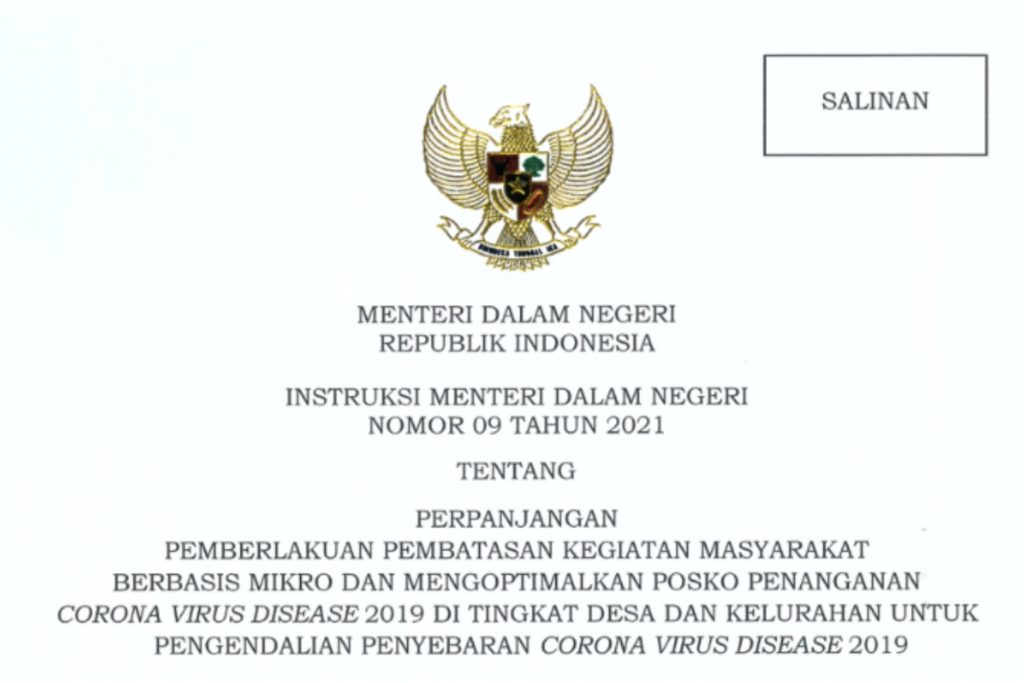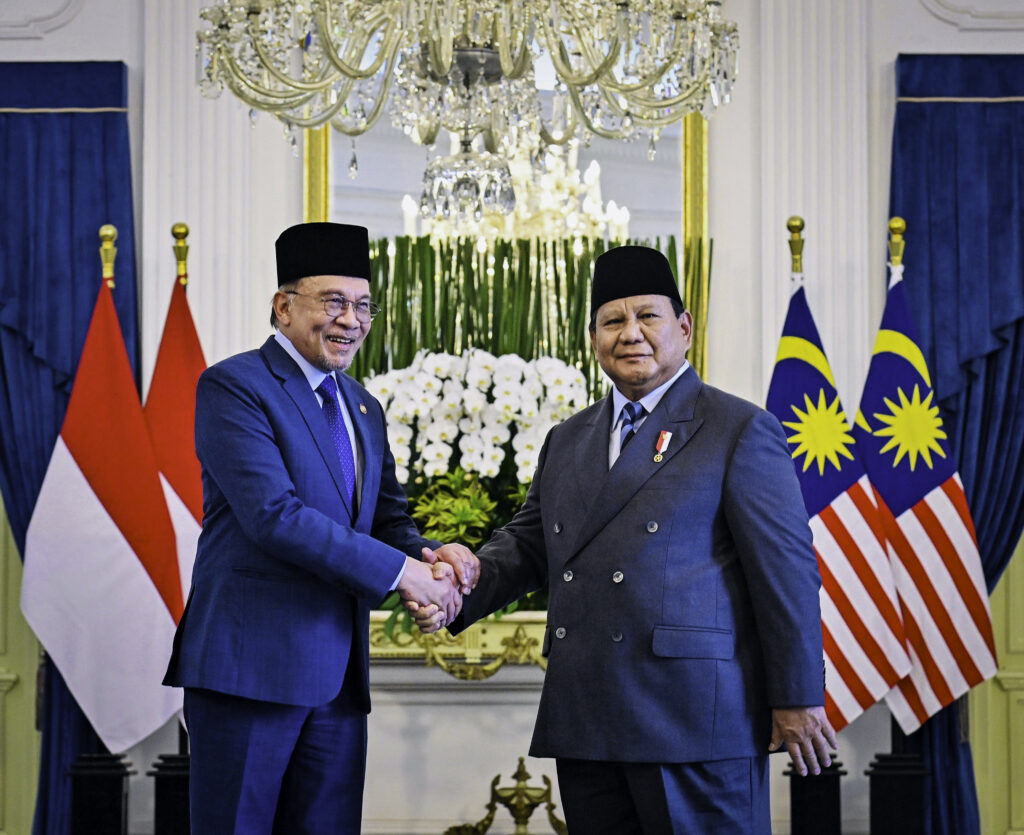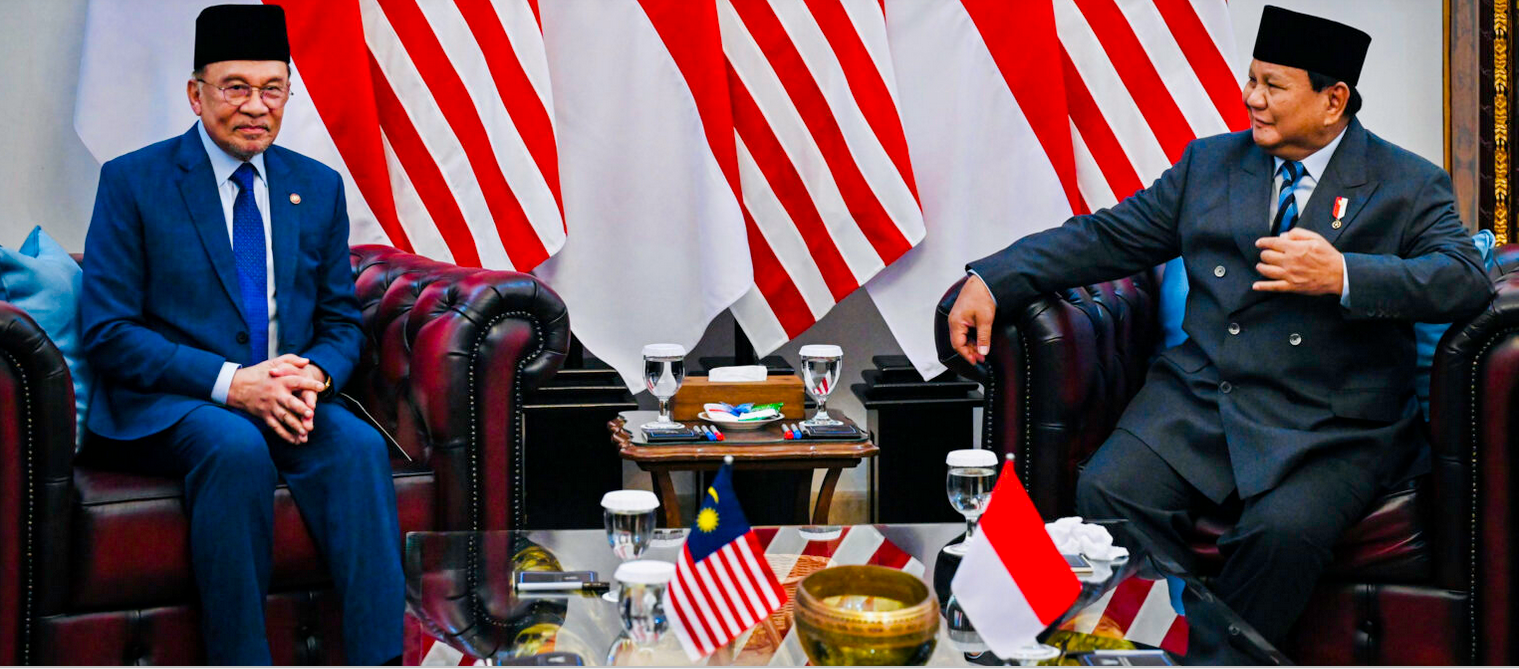Gov’t to Extend Micro-Scale Restrictions in 25 Provinces

The Government continues to extend micro-scale public activity restrictions (Micro PPKM) from 20 April to 3 May 2021.
In Micro PPKM Phase VI, the area of implementation is expanded with the addition of five provinces, namely West Sumatra, Jambi, Bangka Belitung Islands, Lampung and West Kalimantan, as stated in the Instruction of Minister of Home Affairs (Inmendagri) Number 9 of 2021 on Extension of the Micro-Scale Public Activity Restrictions and Optimizing 2019 Corona Virus Disease Management Posts at Village and Sub-District Levels to Control the Spread of Corona Virus Disease which was published on 19 April 2021.
In the previous period, the restrictions had been implemented in 20 provinces, namely Capital Jakarta, Banten, West Java, Yogyakarta, Central Java, East Java, Bali, North Sumatra, East Kalimantan, South Sulawesi, North Sulawesi, South Kalimantan, Central Kalimantan, East Nusa Tenggara, West Nusa Tenggara, Aceh, Riau, South Sumatra, North Kalimantan and Papua.
As instructed by Minister of Home Affairs Tito Karnavian, with the addition of five provinces, governors in 25 provinces can determine and add priority to restricted areas in their respective districts/cities according to regional conditions and pay attention to the scope of restriction treatment.
“The scope of the restriction enforcement includes provinces and districts/cities that meet some criteria, such as the death rate above the national average, the cure rate below the national average, the active case rate above the national average, the Bed Occupancy Ratio (BOR) for the Intensive Care Unit (ICU) and isolation rooms is above 70 percent, and the positivity rate (proportion of positive tests) is above 5 percent,” said Tito.
Meanwhile, the zoning criteria are similar with the provisions of the Micro PPKM in the previous period.
The red zone is defined if there are more than five houses with positive confirmation cases in one neighborhood unit (RT), the orange zone is 3-5 houses, the yellow zone is 1-2 houses, while the green zone is if there are no positive cases in one neighborhood unit.
“Micro PPKM is carried out through coordination between all elements of community, starting from the Head of neighborhood unit/community unit [RW], the Head of Village/Sub-district, the Community Protection Unit (Satlinmas), the Village Guidance Officer (Babinsa), the Bhayangkara Supervisor of Community Security and Order, the Public Order Agency (Satpol PP), the Family Welfare Empowerment Team (PKK), the Integrated Health Post (Posyandu), Dasawisma (housewives community), Community Leaders, Religious Figures, Traditional Figures, Youth Leaders, Assistants, Health Workers, and other volunteers,” said the Minister.
Regarding the coordination, monitoring and evaluation mechanism for the implementation of the Micro PPKM, Tito instructed areas that had not yet established village/sub-district/sub-district level posts to form these posts. Meanwhile, for areas that have established a post are instructed to optimize the role and function of the post.
“Especially for the village-level post, the post can establish or change regulations in the form of village regulations, village head regulations and village head decrees,” he continued.
Furthermore, the Inmendagri regulates that Micro PPKM is carried out in conjunction with district/city PPKM, which consisted of:
- limit workplaces/offices by implementing work from home (WFH) by 50 percent and work from office (WFO) by 50 percent by enforcing more strict health protocols;
- carry out teaching and learning activities online and offline or face-to-face, for universities/academies to be opened in stages with pilot projects stipulated by regional regulations (perda) or regional head regulations (perkada), with the implementation of more strict health protocols;
- for essential sectors such as health, food supply, food, beverages, energy, communication and information technology, finance, banking, payment systems, capital markets, logistics, hospitality, construction, strategic industries, basic services, public utilities, and industries designated as national vital objects and certain objects, daily needs related to the basic needs of the community can still operate 100 percent by regulating operating hours, capacities, and implementing health protocols strictly;
- enforce restrictions on restaurant activities (eating/drinking on the spot by 50 percent and for food services via delivery/take-away is allowed according to restaurant operating hours with the application of stricter health protocols) and limiting operating hours for shopping centers/malls up to 9:00 p.m. with the adoption of more stringent health protocols;
- allow construction activities to operate 100 percent with the application of more strict health protocols;
- places of worship are allowed to open with a capacity of 50 percent with the application of more strict health protocols;
- public facilities are permitted to open with a maximum capacity of 50 percent, the regulation of which is stipulated by regional regulations;
- arts, social and cultural activities that can create crowds are allowed to be held to a maximum of 25 percent with the application of more strict health protocols; and
- arrange the capacity and operational hours of public transportation.
In addition to the Micro PPKM regulation, Minister of Home Affairs also instructed local governments to intensify the discipline of health protocols and strengthen the 3T (testing, tracing, treatment) and coordination between regions.
“The provincial and district/city governments to village and sub-district governments are intensifying health protocol disciplines and health management efforts (distributing masks and promoting the correct way of using masks, washing hands using soap or hand sanitizer, maintaining distance and avoiding crowds that have the potential to cause infection). In addition to strengthening tracking capabilities, tracing systems and management, improving treatment including improving health facilities (beds, ICU rooms, and isolation quarantine), coordination between nearby areas through the Integrated Emergency Management System (SPGDT) for patient redistribution and health workers according to their respective authority,” the Inmendagri reads. (UN) (MMB/EST)








